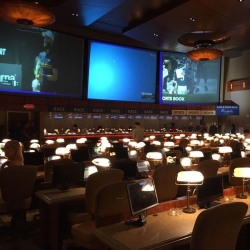As New York lawmakers are discussing casinos in New York City, do not expect to see New Jersey legislators expand casino gaming throughout the state. This was the message from New Jersey Senate President Stephen Sweeney (D) in an interview with The Press of Atlantic City.
Senate Pres. Sweeney, who only three years ago had an ambitious plan to spread two casinos to North Jersey, said the Atlantic City monopoly on casino gambling is going to continue into the foreseeable future. Sweeney added that the success of legal sports betting and online gambling for the Atlantic City casinos is no reason to build gaming operations elsewhere in the Garden State.
In fact, adding two new revenue streams to the AC casinos is one reason for their surprising turnaround. Building competion in East Rutherford or Jersey City could threaten the newfound prosperity.
Sweeney to the newspaper, “Many factors have contributed to the revival of the gaming sector in Atlantic City, including the rejection of the expansion of gaming outside of Atlantic City. Sports gaming and internet gaming provide the opportunity to gamble anywhere in New Jersey, but the benefits also help Atlantic City. That is our intention.”
$2.9 Billion GGR in 2018
Gross gaming revenues reached $2.5 billion for the nine land-based casino operations in 2018, which represents a 4% increase year-to-year on 2017. When one adds the revenues from online gambling ($298.7 million) and seven months of sports betting win ($94 million), the total reaches near $2.9 billion — which is a 9% increase year-to-year.
It is not the $5.4 billion in revenues in the peak year of Atlantic City’s history (2006), but it is a far sight better than the low year of 2014 (close to $2.1 billion). Four casinos failed in 2014, which gutted Atlantic City’s job market, collapsed property taxes on the casino resorts, and left Atlantic City’s finances near bankruptcy.
Atlantic City’s Recovery
The state floated a loan to Atlantic City and took over the city government’s finances, a policy position under Gov. Chris Christie that continues in the Murphy administration. But as the casino industry slowly rebuilds itself, the legislature’s longtime investment in online casinos and poker sites have paid off.
So did Chris Christie’s decision to pursue a 6-year legal battle against the federal government, a decision which eventually led to a US Supreme Court repeal of a federal sports betting ban. The $94 million in winnings last year are but a preview of the hundreds of millions of dollars a year that legal sportsbooks eventually will bring to the state.
Meadowlands Sportsbooks Dominates NYC
Because Jeff Gural’s Meadowlands Racetrack is reaping most of the benefits from sports betting, some New Jersey leaders would like to build new casinos on the banks of the Hudson. Paddy Power-Betfair runs a world class sportsbook at the Meadowlands, which means thousands of New Yorkers cross the river to make wagers in the legal bookmaker operation in the New York City metropolitan area.
When New York state rejected a sports betting bill, Gural (who owns Tioga Downs in New York) quipped that he was happy it got rejected — the decision left him with the New York City sportsbook monopoly.
2016 North Jersey Casino Referendum
Not long ago, Jeff Gural supported the North Jersey casino referendum. He wanted to build a $1 billion casino in the Meadowlands. But a 2016 casino referendum failed by a wide margin — 78% to 22% — and few of its supporters want to go through that ordeal again.
Backers like Jeff Gural stopped funding their get-out-the-vote operations a month before the election, because they knew the cause was hopeless. When Gural, was asked about a new referendum recently, he said, “I would not want to see it back on the ballot unless we know we’re going to win.”
As for Stephen Sweeney, he told The Press of Atlantic City, “I don’t see any way where it comes back. It was crushed.”
2020 or 2022 North Jersey Casino Referendum?
At the time, some of the backers said a new ballot initiative would have received more support. They pointed to the fact that the 2016 referendum was ill-conceived because it lacked specificity. No city or county was named in the plane, so every resident of North Jersey was concerned they would receive the casino — thus causing more traffic congestion into New York City.
The real crossroads will be when New York state decides to vote on a New York City casino bill. If ever the Empire State decides to build casinos in the New York City area, it would have negative economic effects on Atlantic City. Then it might make sense for AC casino operators to build casinos closer to New York City, to retrieve some of the lost revenues. Until that happens — and it might never happens — a North Jersey casino referendum seems like a dead letter.

